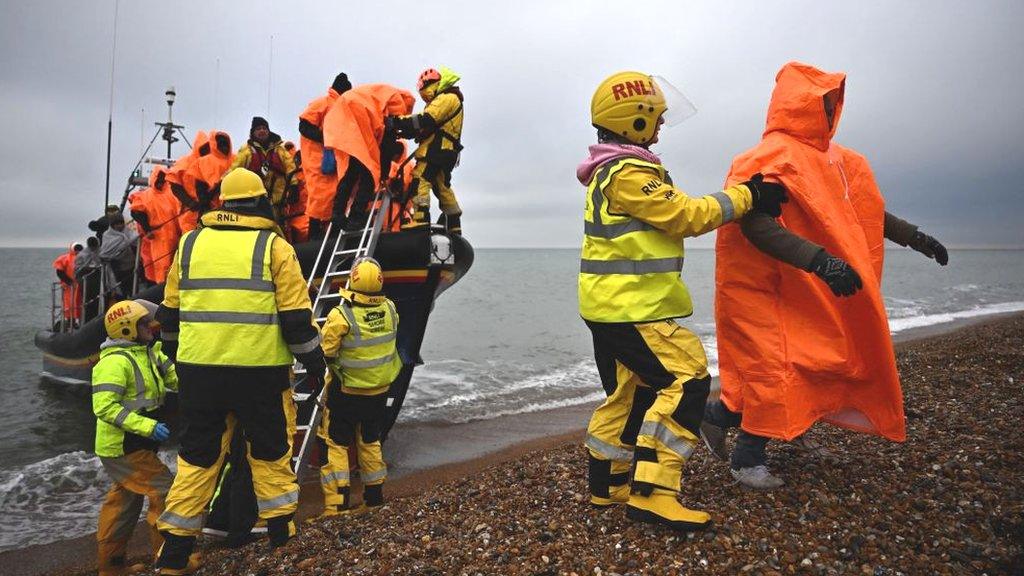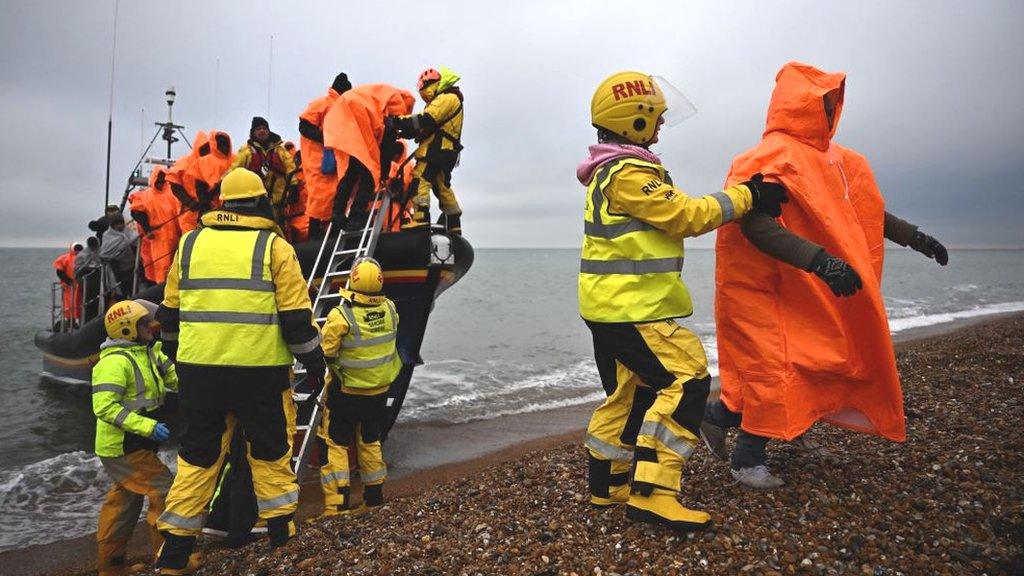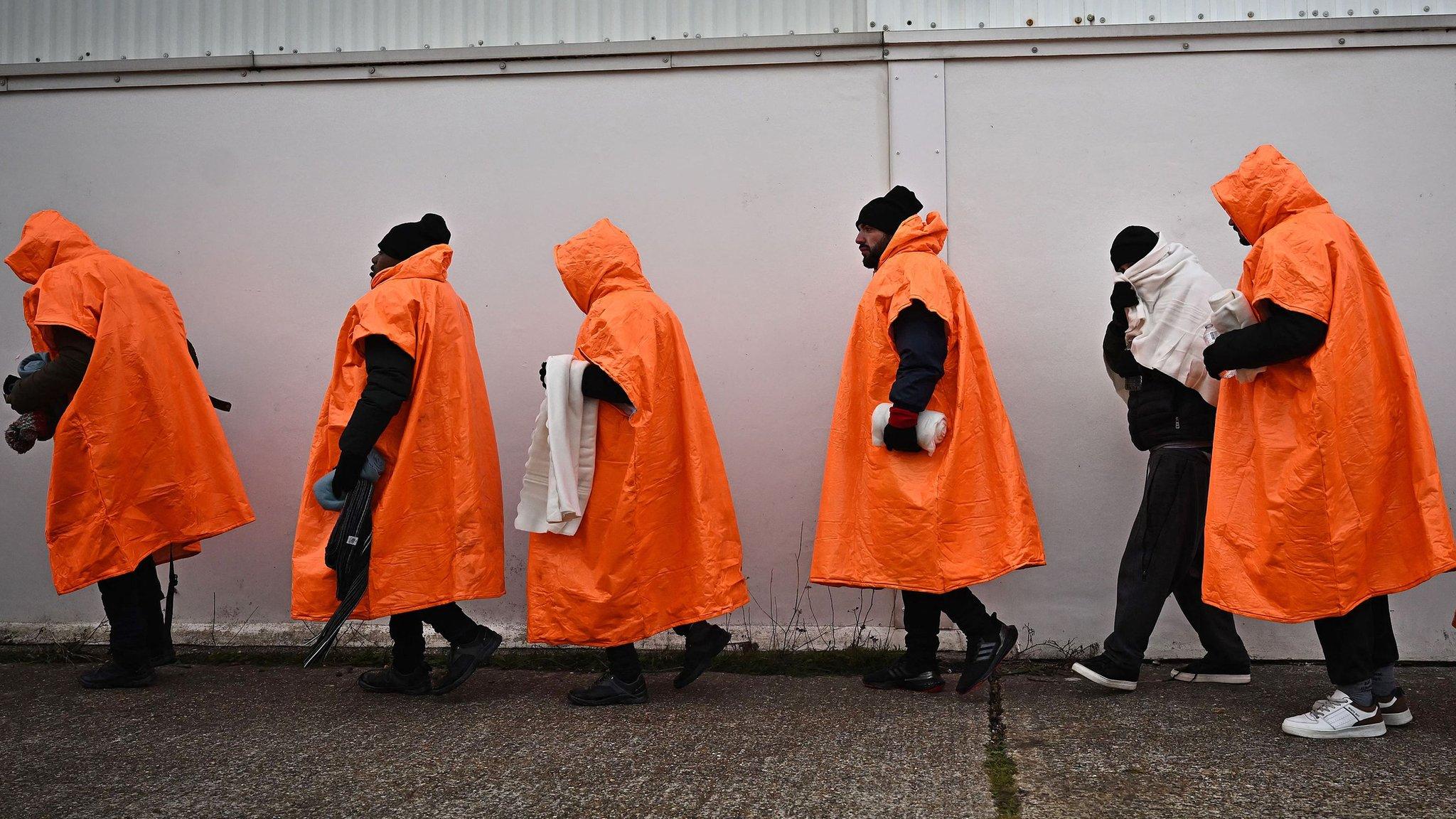Not detaining child migrants creates pull factor - Sunak
- Published
Rishi Sunak says children will be housed in “appropriate” holding accommodation and not separated from their families.
Exempting children arriving in the UK on small boats from detention would create a "pull factor" and would put minors at risk, Rishi Sunak has said.
The government's Illegal Migration Bill creates new powers to detain and remove those arriving in the UK illegally.
On Tuesday, the prime minister argued these plans must include families so there was no "incentive" for people to bring children with them.
He also downplayed suggestions the Rwanda scheme could begin this summer.
Asked about the treatment of children at the Liaison Committee, Mr Sunak said: "The intention of this policy is not to detain children.
"But it's important that we don't inadvertently create a policy that incentivises people to bring children who wouldn't otherwise come here.
"We don't want to create a pull factor to make it more likely that children are making this very perilous journey in conditions that are appalling."
Under the Illegal Migration Bill, those arriving in the UK illegally will be detained and removed, either to Rwanda or another "safe" third country.
The bill also removes previous limits, which meant families with children could only be detained for 72 hours before being deported.
By law, councils have a duty to safeguard under-18s in their area. Unaccompanied children illegally brought to the UK would be exempt from detention and deportation, though the bill does allow the home secretary to arrange for their removal anyway.
Under questioning from Caroline Nokes, the Conservative chair of the Equalities Select Committee, Mr Sunak said children would not be "separated from their families" and would be housed in appropriate accommodation before being removed.
The prime minister said it would the Home Office's responsibility to oversee this.
The legislation, unveiled earlier this month, would also prevent anyone entering the UK illegally from claiming asylum.

Over 45,000 people reached the UK via the dangerous route last year - up from around 300 in 2018
The Illegal Migration Bill is currently being fast-tracked through the House of Commons., external MPs debated the bill in detail on Tuesday.
Mr Sunak has had to defend the bill from rebellions from both wings of his party - agreeing to discuss further measures with those wanting to toughen up the bill.
At the Liaison Committee, Mr Sunak repeatedly refused to criticise Suella Braverman's claims the UK faced an "invasion" of migrants.
Dame Diana Johnson, Labour's Home Affairs Committee chair, asked if the home secretary's language was "politically charged".
Mr Sunak told the Liaison Committee: "It's very clear that the scale of the problem is significant and growing.
"When you've had a quadrupling or quintupling of the number of illegal arrivals in the space of just two years, it's important to actually recognise the pace of what's happening, and that's a very large number and it's growing very quickly."
Earlier this month several papers reported a source in the Home Office claiming there were plans to get flights to Rwanda off the ground by the summer.
Under the scheme the Home Office will run a five-year trial to send some asylum seekers to Rwanda, to claim asylum there.
But Mr Sunak said: "No one has promised flights by the summer. What we've said is we'll start flights as soon as we can after legal proceedings have completed."
What is the Liaison Committee?
The Liaison Committee is a super-committee made up of the chairs of 14 senior select committees.
The heads of committees covering areas such as home affairs, foreign affairs and the Treasury come together to form a team of policy specialists to question the government's record in office.
They are presided over by Sir Bernard Jenkin, who is chair of the Public Administration and Constitutional Affairs Committee.
It meets three times a year, specifically to scrutinise the work of the prime minister. Like the Houses of Parliament, the majority of members of the committee are Conservative MPs.
- Published25 March 2023

- Published13 December 2023
